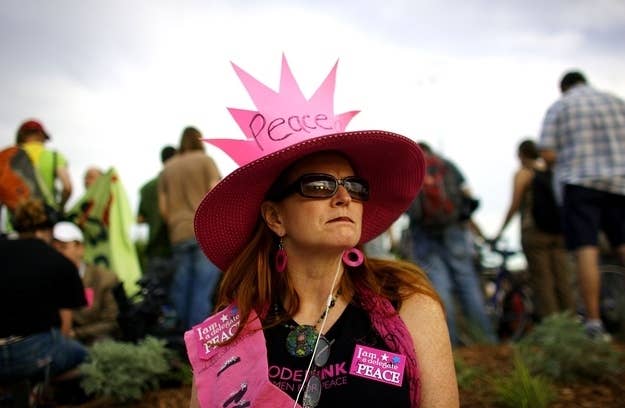
WASHINGTON — On the eve of American military intervention in Syria, the once-robust antiwar movement has stayed curiously silent.
Activists who turned out thousands of protesters during the lead-up to the invasion of Iraq say they've been unable to effectively organize or raise money since the end of the Bush years, and that newer causes like drones have seized the space on the left once occupied by opposition to conventional warfare. And some acknowledge that the energy has leaked out of the movement because a Democrat is now in office. Though some groups have organized online petitions and some real-life protests, the antiwar crowd that was on fire before the war in Iraq has made hardly a dent in the conversation surrounding Syria.
"Well, the most incredibly depressing thing was that most of the groups that existed before don't exist anymore," said Medea Benjamin, the founder of Code Pink. "That's the number one problem, is that the antiwar movement is a shadow of its former self under the Bush years."
Benjamin pointed to groups like United for Peace and Justice, a Communist Party-connected group, as examples: "They're down to a couple of volunteers," she said.
Code Pink itself, despite being one of the most visible protest groups in the U.S. today, has felt the pinch.
"Even Code Pink, which had 300 local groups, just has a tiny portion still functioning," Benjamin said. "So when something like this happens, we don't have the infrastructure to rally people."
Some activists argue that it's mostly an issue of money and membership, and not an indication that the left supports Syria intervention.
"Among the long-standing peace and disarmament groups that we work with, everybody is angry and pissed about what seems to be an imminent attack," said Kevin Martin, the executive director of Peace Action. "Public opinion is not supporting it either. But you're not going to see hundreds of thousands of people in the street."
"I don't think me or Medea or anyone else should be defensive about that," Martin said. "We don't push a button and get hundreds of thousands of people in the streets."
Martin blamed the anemic response among peace groups to Syria on the economy, noting that all nonprofits are struggling — not just protest groups.
Plus, Martin said, the energy on the left has been focused on drones and civil liberties, which "doesn't rise to the level of an obviously unjust war where hundreds of thousands of people are being killed because of a belligerent president."
Though Benjamin and Martin both say the fact that Obama is a Democrat is not to blame, other antiwar stalwarts suspect the energy fizzled out when a Republican antagonist was no longer in office.
"The Democrats are missing in action because of course the president is a Democrat," said David Swanson, a longtime antiwar activist and author of War Is a Lie and When the World Outlawed War, who works with Roots Action, a progressive nonprofit. "That's the biggest factor, I think. What's tamping down the activism is partisanship."
"This started in 2007 when it was time to focus on electing a Democratic president and the Democrats forgot about the wars," Swanson said. "We've been struggling ever since to get back to where we were in 2006."
Swanson also blamed the apathy on the left on a belief that intervening in Syria is a humanitarian mission, whereas with Iraq the sales pitch was defense-related.
"The war in Syria is incredibly unpopular according to the polls, but there are some who support it because they believe it's philanthropy," he said.
Swanson sees hope for the antiwar cause in the fact that most Americans oppose intervening in Syria, according to polling.
"It's a major accomplishment to have a majority telling pollsters no from the start, not a year into it," he said.
There are glimmers of life: Code Pink is protesting the imminent attack in Syria during today's March on Washington, and Roots Action and other groups have marshaled online activists into signing petitions.
"Those of us still working on this have been mobilizing," Benjamin said. "The online protests are proliferating. There's petitions to Obama, there's calls for Congress to get involved — so many groups from Code Pink to Win Without War to Just Foreign Policy — all have put out calls saying no war in Syria."
But mostly, the movement has been left for dead even by those who were once leading figures in it.
"What antiwar movement?" former Congressman Dennis Kucinich asked when called for comment on Wednesday.
"What antiwar groups?" said Justin Raimondo, longtime editor of Antiwar.com.
In Raimondo's view, the movement hasn't exactly disappeared as much as been reborn among young libertarians who have taken up the mantle from the previous generation of baby-boomer leftist peace activists.
"The antiwar actions of the Bush years were basically energized by the extreme left, the Old Left Marxists," Raimondo said. "But they are getting on in years, and they aren't recruiting many young people (yet), so the various antiwar coalitions have far less components."
